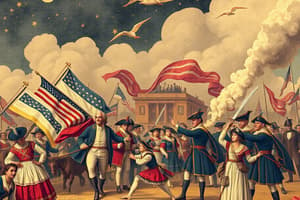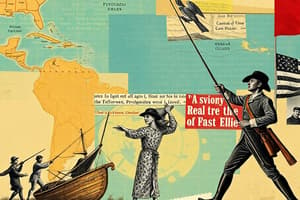Podcast
Questions and Answers
What happened at the Boston Massacre?
What happened at the Boston Massacre?
British soldiers fired at the crowd of colonists and killed five people. The soldiers were upset because colonists were throwing snowballs at them.
Why did Paul Revere create artwork depicting the Boston Massacre?
Why did Paul Revere create artwork depicting the Boston Massacre?
Paul Revere wanted to depict the colonists as innocent victims and the British soldiers as aggressors to promote the cause of American independence.
What is the purpose of the preamble of the Declaration of Independence?
What is the purpose of the preamble of the Declaration of Independence?
The preamble of the Declaration of Independence outlines the concept of natural rights and the reason for declaring independence from Britain.
What is the purpose of the grievances section of the Declaration of Independence?
What is the purpose of the grievances section of the Declaration of Independence?
What is the purpose of the denunciation section of the Declaration of Independence?
What is the purpose of the denunciation section of the Declaration of Independence?
Define Manifest Destiny.
Define Manifest Destiny.
How did the experiences of Native Americans during the period of Western expansion affect them?
How did the experiences of Native Americans during the period of Western expansion affect them?
Which of the following was a direct consequence of the cotton gin's invention?
Which of the following was a direct consequence of the cotton gin's invention?
What is the main cause of the Civil War?
What is the main cause of the Civil War?
Explain why the concept of secession happened.
Explain why the concept of secession happened.
Flashcards
Who did the colonists fight in the Revolutionary War?
Who did the colonists fight in the Revolutionary War?
The British and King George III were the main enemies during the Revolutionary War.
What was the Boston Massacre?
What was the Boston Massacre?
The Boston Massacre was a deadly incident where British soldiers fired on unarmed colonists in Boston, killing five people. It sparked outrage and fueled the growing tensions leading to the Revolutionary War.
How did Paul Revere's artwork depict the Boston Massacre?
How did Paul Revere's artwork depict the Boston Massacre?
Paul Revere's famous engraving of the Boston Massacre depicted British soldiers firing on innocent civilians, portraying the event as a brutal act of tyranny.
What is the Declaration of Independence?
What is the Declaration of Independence?
Signup and view all the flashcards
What is the purpose of the different parts in the Declaration of Independence?
What is the purpose of the different parts in the Declaration of Independence?
Signup and view all the flashcards
What is the Constitution?
What is the Constitution?
Signup and view all the flashcards
What is the Bill of Rights?
What is the Bill of Rights?
Signup and view all the flashcards
What rights do we have according to the Bill of Rights?
What rights do we have according to the Bill of Rights?
Signup and view all the flashcards
What are the branches of US Government?
What are the branches of US Government?
Signup and view all the flashcards
What is the representation in Congress?
What is the representation in Congress?
Signup and view all the flashcards
How many representatives are there in Congress?
How many representatives are there in Congress?
Signup and view all the flashcards
How is representation in the House of Representatives determined?
How is representation in the House of Representatives determined?
Signup and view all the flashcards
What are checks and balances?
What are checks and balances?
Signup and view all the flashcards
How do the different branches check each other?
How do the different branches check each other?
Signup and view all the flashcards
What is Manifest Destiny?
What is Manifest Destiny?
Signup and view all the flashcards
What was the experience of Native Americans during westward expansion?
What was the experience of Native Americans during westward expansion?
Signup and view all the flashcards
How did Manifest Destiny lead to conflict?
How did Manifest Destiny lead to conflict?
Signup and view all the flashcards
What was slavery?
What was slavery?
Signup and view all the flashcards
What is secession?
What is secession?
Signup and view all the flashcards
Why did states secede from the Union?
Why did states secede from the Union?
Signup and view all the flashcards
What was the main cause of the Civil War?
What was the main cause of the Civil War?
Signup and view all the flashcards
What was the Union and Confederacy thinking before the start of the Civil War?
What was the Union and Confederacy thinking before the start of the Civil War?
Signup and view all the flashcards
What was Sherman's Atlanta Campaign?
What was Sherman's Atlanta Campaign?
Signup and view all the flashcards
What is total war strategy?
What is total war strategy?
Signup and view all the flashcards
Study Notes
Structure of the Test
- The midterm exam has 10 multiple choice questions (1 point each)
- A chart about the branches of government (15 points)
- 9 short answer questions (ranging from 1 to 3 sentences, point values vary)
- A vocabulary fill-in-the-blank section (5 words, 1 point each)
- A long answer question (1 paragraph, 20 points)
- Many questions require analysis of primary and secondary sources
- Total points: 100
Unit 1: Colonization, Pre-Revolutionary Tensions, Revolutionary War
- Revolutionary War opponents: Britain, King George III
- Boston Massacre: Colonists threw snowballs at British soldiers, soldiers fired, 5 people died. A depiction by Paul Revere intended to show the British as aggressors
- Declaration of Independence:
- Purpose is to declare independence from Britain.
- Explains how governments should operate and the rights they should protect.
- Explains the wrongs done by Britain
- Preamble: Argues that all people have natural rights (life, liberty, pursuit of happiness) to which governments must adhere. Explains what happens when the government doesn't uphold these rights
- Grievances: A list of injustices committed by the British government.
- Denunciation: States that the colonists are no longer under British rule, due to the injustices listed in the grievances section.
Unit 2: Constitution and Civics
- Constitution: fundamental principles that govern a state or country. The U.S. Constitution is the highest law and explains how the branches of government work.
- Bill of Rights: first ten amendments to the U.S. Constitution, guaranteeing freedoms like speech, assembly, and worship.
- Branches of Government:
- Legislative: Congress (Senate and House of Representatives), makes laws
- Executive: President, Vice President, Cabinet, enforces laws
- Judicial: Supreme Court, interprets laws
- Representation in Congress:
- 535 representatives (435 in House, 100 in Senate)
- Determined by population (larger states have more representatives in the House)
- Two senators per state (in the Senate)
- Checks and Balances: a system to prevent one branch of government from becoming too powerful. Each branch can check the power of the other branches
Unit 3: Westward Expansion and Manifest Destiny
-
Manifest Destiny: The belief that the expansion of the United States was justified and inevitable.
-
Native American experiences: Native Americans were forced from their homes, often onto reservations, and faced displacement and violence as white settlers expanded westward.
-
Conflict: Conflicts were sparked as white settlers took over lands that Native Americans resided in
-
Unit 4: Antebellum Society and Civil War
-
Slavery and the Cotton Gin: The invention of the cotton gin increased the demand for enslaved labor to grow and process cotton, leading to conflict between the North and the South.
-
Secession: States in the South wanted to withdraw from the Union to protect and expand slavery.
-
Civil War causes: Fundamental disagreements over slavery and states' rights eventually led to war between the North and South.
-
Understandings about the Union and Confederacy's thinking before the war: The Union did not want to fight but the South wanted to maintain their independence as a separate entity.
Additional Study Resources
- Midterm Exam Vocabulary Sheet (20 words)
- iCivics Bill of Rights sheet
- Classwork about the above materials
- Assessments (quizzes, tests, or projects focusing on the above-mentioned content)
Content to Ignore for Studying
- Maps
Studying That Suits You
Use AI to generate personalized quizzes and flashcards to suit your learning preferences.




